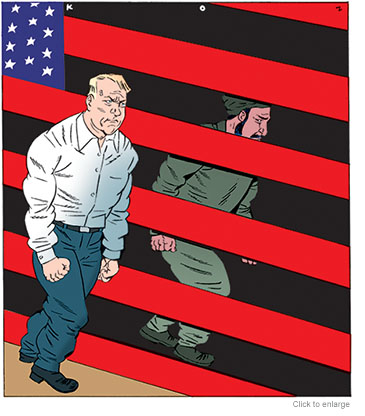Editorial: Pen and Angst
 Satire provides a diagnosis of societal ills. Its protected status is an essential symptom of a healthy society. And the satirical cartoon, bold and blatant, is the most visible sign of that well-being. Mature democracies –– out-of-shape, morally lazy, corrupt –– are willing to listen to the bad news, nod or snarl, and largely ignore it. Autocracies refuse to hear the prognosis and instead threaten, punish or even kill the messenger.
Satire provides a diagnosis of societal ills. Its protected status is an essential symptom of a healthy society. And the satirical cartoon, bold and blatant, is the most visible sign of that well-being. Mature democracies –– out-of-shape, morally lazy, corrupt –– are willing to listen to the bad news, nod or snarl, and largely ignore it. Autocracies refuse to hear the prognosis and instead threaten, punish or even kill the messenger.
I’ve read many hedged salutes to the slain cartoonists of Charlie Hebdo, words of praise tempered with the assurance that the writer was also offended by their swipes at religion. Sympathy was expressed for the devout and, in some cases, the cartoonists were cast as bullies, putting it to a Muslim minority already abused by the haughty French. But the cartoonists weren’t going after the powerless –– unless those powerless were wielding Kalashnikovs –– nor their religion, they were attacking the leaders who sought to use their interpretation of the Koran to impose their political will on the unwilling. They weren’t ‘kicking down’ –– their ink-stained boots were aimed at the top, all the way to Paradise.
In a theocracy, how do you separate politics from religion? Some of the nastier responses I’ve personally received were for cartoons I did about the previous Pope and the workings of the Holy See at an international UN conference on population growth. I felt justified going after the Church’s teachings on birth control because they had exited the pulpit and gone out into the world seeking to impose their views on everyone else. They were playing politics and thus fair game. So, too, the Islamic fundamentalists with dreams of empire who want to rule a Caliphate and beyond. They proselytize the non-believer at the barrel of a gun.
I wouldn’t endorse cheap satirical shots at, say, animists. But what if they gave me the choice to worship the spirit in a rock or else be stoned by it? Satire is the enemy of orthodoxy and moral relativism.
The Je Suis Charlie, I am Spartacus, moment for the western press would have been to publish at least some of the original derogatory cartoons and the new Charlie Hebdo cover. Very few of the major publications in the U.K. or North America published the first offenders. The New York Times did neither. Due to its prestige and influence in the shrinking world of print journalism, the Times had the greatest responsibility to cover the story and inform the reader by offering the visual evidence that was at the core of it. That they did not, using the excuse that they didn’t want to offend the sensibilities of certain readers (like the little old jihadist in Mosul?) is a terrible pity. Worse yet, their inaction left cartoonists and other commentators without necessary cover.
In a NY Times article which smacked of self-justification, the theme of ‘maybe they went too far,’ which is the polite way of saying ’they got what they deserved,’ emerged. It was clear that cartoonists, so-called satirists, who came of age in the U.S. after the 60s largely didn’t get the screw-you approach of Charlie Hebdo. I began working in the field in 1980 and have charted with dejection its downward trajectory in terms of originality, risk and, ultimately, reward. The establishment of hyper-capitalism in the Reagan years coincided with the rise of political correctness and dwindling ad dollars to create a climate of editorial timidity that drove cartoonists to sitcom punchlines, self-censorship and the unemployment line.
The lesson is that these freedoms of expression are extremely fragile –– Larry Flynt, noted 1st Amendment champion, pointed out that parody and satire have only been protected speech in the U.S. since 1988. We have to protect the worst to defend the best. And those of us who didn’t have to fight to secure these freedoms and feel comfortable nestled in front of our screens judging those who did and do, don’t really appreciate their value.
Though the very idea of martyrdom makes me uneasy and I suspect that they would have mocked the idea, Charb, Wolinski, Cabu and Tignous did choose a course which led to the ultimate sacrifice for an ideal.
I think some of the criticism from the left is veiled envy for the ballsiness of these guys. I know I feel put to shame. And left wondering if the irreplaceable liberties I've always taken for granted can survive this age of thin skin, thick heads and tribalism.
Martin Kozlowski
1/15/15
PEN America and Charlie Hebdo
Charlie Hebdo, Before the Massacre Video
Robert Crumb on the Massacre
Tim Kreider
on Cartooning in the U.S.
Spiked Interview with Bill Leak
VICE interview with Charlie Hebdo cartoonist Luz


